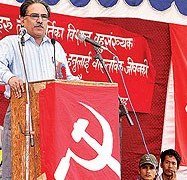 With the advent of September, Maoist chairman Prachanda has stepped up his warnings of mass protests in Kathmandu if the rebels’ demands for the election of a constituent assembly were not met. Prime Minister Girija Prasad Koirala’s government is not paying enough attention to the peace talks, Prachanda said in an address to a rally in the capital. But the rebels would leave no stone unturned for peace.
With the advent of September, Maoist chairman Prachanda has stepped up his warnings of mass protests in Kathmandu if the rebels’ demands for the election of a constituent assembly were not met. Prime Minister Girija Prasad Koirala’s government is not paying enough attention to the peace talks, Prachanda said in an address to a rally in the capital. But the rebels would leave no stone unturned for peace.Such a capital-centred revolution would conform to the urban-uprising component of the Maoist “People’s War.” It would also be in keeping with the Maoists’ pledge that they would not return to the jungle even if the peace process collapsed. Considering that the rebels’ ceasefire ends in the last week of October – that ominous prefix of Prachanda’s next revolution – there must be some disquiet among the republican wing of Koirala’s Nepali Congress. (That in turn must have inspired Sher Bahadur Deuba, head of the rival Nepali Congress (Democratic) to indulge in some posturing ahead of party reunification talks.)
Prachanda’s warning comes after a central committee meeting of the rebels accused the government of joining forces with the palace in a bid to maintain the status quo. Maoist spokesman Krishna Bahadur Mahara told reporters that the meeting had concluded that the government was joining hands with anti-democratic elements (read: palace) to preserve the status quo. By indicting every constituent of the Seven Party Alliance, the Maoists have signaled their unwillingness to be considered merely as an eighth player in the anti-palace coalition.
Arms management should be addressed only after an agreement on an interim constitution and government is reached, the Maoists said in a statement. That conflicts with the government’s as well as the principal external stakeholders’ stand. Yet Mahara sounded hopeful that all political issues would be resolved through dialogue. The rebels have refused to disarm, but seem ready to place their weapons at sites under UN supervision, provided there are similar controls on the Nepal Army. How much room that leaves for compromise obviously depends on one’s level of optimism. Skeptics can draw comfort from some cynicism. Perhaps it’s too early to start worrying.
With so many blanks to fill in the draft of the interim constitution, the imperative of phrasing an acceptable text on managing arms might not be on too many influential minds right now. But, then, the fact that October is less than a month away must be.